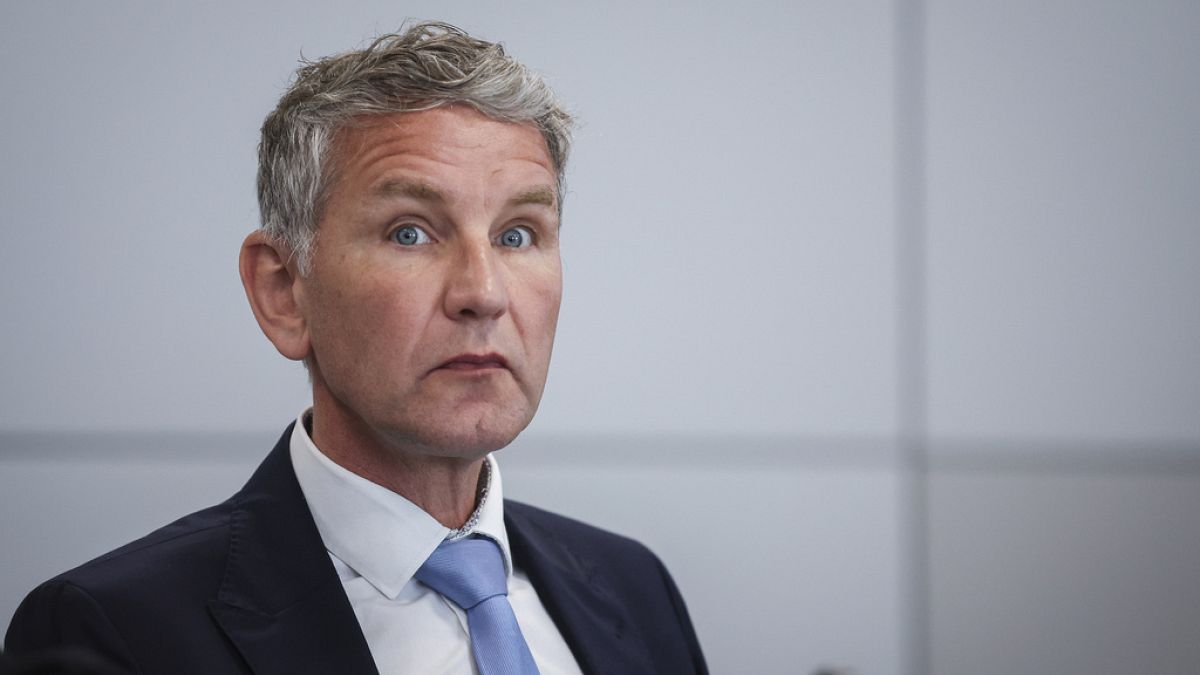World
Top EU court rules Poland’s justice reforms infringe EU law

European Commission brought case over 2019 changes that bar Polish courts from applying EU law in some cases.
The European Court of Justice (ECJ), the European Union’s highest court, has ruled that Poland’s 2019 justice reforms infringe the bloc’s rule of law.
The ruling came on Monday after the European Commission, the bloc’s executive branch, took Warsaw to court in February, arguing that the Polish Supreme Court lacked the necessary independence and impartiality to rule on the matter.
Poland introduced a law in 2019 that prevents Polish courts from applying EU law in certain areas and from referring legal questions to the ECJ.
On Monday, the Luxembourg-based ECJ said Poland’s ruling Law and Justice Party’s judicial reforms were damaging the independence of judges and undermining the rule of law.
“The Polish justice reform of December 2019 infringes EU law,” the ECJ said in a statement, adding, “The value of the rule of law is an integral part of the very identity of the European Union.”
The court also said publishing online declarations on judges’ membership in associations, nonprofit foundations or political parties violated their right to privacy and could be used to sway them.
The rift between Brussels and Warsaw over Poland being accused of defying the EU’s rule of law has been a longstanding battle.
The 27-member bloc has withheld allocating billions of euros to Poland from the EU budget until Warsaw pledges to abide by the bloc’s rules, and the ECJ also slapped a 1 million euro ($1.07m) daily fine on the country, which was later reduced to 500,000 euros ($535,640) in April, over its refusal to comply with the EU’s interim measures to change its judicial reforms.
On Monday, the ECJ said Poland is “obligated to make the daily penalty payments”.
The court’s announcement also comes several months before Poland heads to the polls.
Over the weekend, large crowds protested in Krakow and other cities across the nation of 38 million people against the government’s policies.
Poland’s ruling party has yet to react to the latest ruling.
A hardline deputy justice minister, Sebastian Kaleta, swiftly dismissed the ruling as “farce”.

World
Argentina reports its first single-digit inflation in 6 months as markets swoon and costs hit home

Argentina’s monthly inflation rate eased sharply to a single-digit rate in April for the first time in half a year, data released Tuesday showed, a closely watched indicator that bolsters President Javier Milei’s severe austerity program aimed at fixing the country’s troubled economy.
Prices rose at a rate of 8.8% last month, the Argentine government statistics agency reported, down from a monthly rate of 11% in March and well below a peak of 25% last December, when Milei became president with a mission to combat Argentina’s dizzying inflation, among the highest in the world.
ARGENTINA WILL GET NEXT INSTALLMENT OF BAILOUT AS IMF PRAISES MILEI’S AUSTERITY POLICIES
“Inflation is being pulverized,” Manuel Adorni, the presidential spokesperson, posted on social media platform X after the announcement. “Its death certificate is being signed.”
Although praised by the International Monetary Fund and cheered by market watchers, Milei’s cost-cutting and deregulation campaign has, at least in the short term, squeezed families whose money has plummeted in value while the cost of nearly everything has skyrocketed. Annual inflation, the statistics agency reported Tuesday, climbed slightly to 289.4%.
“People are in pain,” said 23-year-old Augustin Perez, a supermarket worker in the suburbs of Buenos Aires who said his rent had soared by 90% since Milei deregulated the real estate market and his electricity bill had nearly tripled since the government slashed subsidies. “They say things are getting better, but how? I don’t understand.”
A vendor waits for customers at the central market for fruit and vegetables in Buenos Aires, Argentina, Friday, May 10, 2024. (AP Photo/Natacha Pisarenko)
Milei’s social media feed in recent weeks has become a stream of good economic news: Argentine bonds posting some of the best gains among emerging markets, officials celebrating its first quarterly surplus since 2008 and the IMF announcing Monday it would release another $800 million loan — a symbolic vote of confidence in Milei’s overhaul.
“The important thing is to score goals now,” Milei said at an event Tuesday honoring former President Carlos Menem, a divisive figure whose success driving hyperinflation down to single digits through free-market policies Milei repeatedly references. “We are beating inflation.”
Even so, some experts warn that falling inflation isn’t necessarily an economic victory — rather the symptom of a painful recession. The IMF expects Argentina’s gross domestic product to shrink by 2.8% this year.
“You’ve had a massive collapse in private spending, which explains why consumption has dropped dramatically and why inflation is also falling,” said Monica de Bolle, a senior fellow at the Peterson Institute for International Economics who studies emerging markets. “People are worse off than they were before. That leads them to spend less.”
Signs of an economic slowdown are everywhere in Buenos Aires — the lines snaking outside discounted groceries, the empty seats in the city’s typically booming restaurants, the growing strikes and protests.
At an open-air market in the capital’s Liniers neighborhood, Lidia Pacheco makes a beeline for the garbage dump. Several times a week, the 45-year-old mother of four rummages through the pungent pile to salvage the tomatoes with the least mold.
“This place saves me,” Pacheco said. Sky-high prices have forced her to stick to worn-out clothes and shoes and change her diet to the point of giving up yerba mate, Argentina’s ubiquitous national drink brewed from bitter leaves. “Whatever I earn from selling clothes goes to eating,” she said.
Argentina’s retail sales in the first quarter of 2024 fell nearly 20% compared to the year before, a clip comparable to that of the 2020 pandemic lockdowns. The consumption of beef — an Argentine classic — dropped to its lowest level in three decades this quarter, the government reported, prompting panicked editorials about a crisis in Argentina’s national psyche.
“Now I buy pork and chicken instead,” said Leonardo Buono, 51-year-old hospital worker. “It’s an intense shock, this economic adjustment.”
Milei, a self-proclaimed “anarcho-capitalist” and former TV personality, warned his policies would hurt at first.
He campaigned brandishing a chainsaw to symbolize all the cutting he would do to Argentina’s bloated state, a dramatic change from successive left-leaning Peronist governments that ran vast budget deficits financed by printing money.
Promising the pain would pay off, he slashed spending on everything from construction and cultural centers to education and energy subsidies, from soup kitchens and social programs to pensions and public companies. He has also devalued the Argentine peso by 54%, helping close the chasm between the peso’s official and black-market exchange rates but also fueling inflation.
Inflation in the first four months of 2024 surged by 65%, the government statistics agency reported Tuesday. Prices in shops and restaurants have reached levels similar to those in the U.S. and Europe.
But Argentine wages have remained stagnant or declined, with the monthly minimum wage for regulated workers just $264 as of this month, with workers in the informal economy often paid less.
Today that sum can buy scarcely more than a few nice meals at Don Julio, a famous Buenos Aires steakhouse. Nearly 60% of the country’s 46 million people now live in poverty, a 20-year high, according to a study in January by Argentina’s Catholic University.
Even as discontent appears to rise, the president’s approval ratings have remained high, around 50%, according to a survey this month by Argentine consulting firm Circuitos — possibly a result of Milei’s success blaming his predecessors for the crisis.
“It’s not his fault, it’s the Peronists who ruined the country, and Milei is trying to do his best,” said Rainer Silva, a Venezuelan taxi driver who fled his own country’s economic collapse for Argentina five years ago. “He’s like Trump, everyone’s against him.”
Argentina’s powerful trade unions and leftist political parties have pushed back against Milei with weekly street protests, but haven’t managed to galvanize a broad swath of society.
That could change — last week, a massive protest against budget cuts to public universities visibly hit a nerve, drawing hundreds of thousands of people.
“The current situation is completely unsustainable,” said de Bolle, the economy expert.
World
Co-leader of Germany's far-right AfD party fined for using Nazi slogan

The case involved Björn Höcke’s use of “Everything for Germany!” in a 2021 speech. While prosecutors said he knew it was originally a Nazi slogan, Höcke claimed it was an “everyday saying”.
Björn Höcke, who is one of the best-known figures in the far-right Alternative for Germany party, has been fined for using a Nazi slogan in a speech.
The verdict on Tuesday in his trial comes months before a regional election in the eastern state of Thuringia in which he plans to run for the governor’s job.
The state court in the eastern city of Halle convicted Höcke of using symbols of an unconstitutional organisation, German news agency dpa reported. It imposed a fine of 13,000 euros.
The charge can carry a maximum sentence of three years in prison. Prosecutors had sought a six-month suspended sentence, whilst his defence lawyers argued for acquittal.
The case centred on a speech in Merseburg in May 2021 in which Höcke used the phrase “Everything for Germany!” Prosecutors contended he was aware of its origin as a slogan of the Nazis’ SA stormtroopers, but Höcke has argued that it is an “everyday saying.”
He testified at the trial that he is “completely innocent.” The former history teacher described himself as a “law-abiding citizen.”
The 52-year-old Höcke is an influential figure on the hard right of the AfD. He has led its regional branch in Thuringia since 2013, the year the party was founded, and is due to lead its campaign in a state election set for September 1.
He once called the Holocaust memorial in Berlin a “monument of shame” and called for Germany to perform a “180-degree turn” in how it remembers its past. A party tribunal in 2018 rejected a bid to have him expelled.
Prosecutor Benedikt Bernzen argued in Tuesday’s closing arguments that Höcke had used Nazi vocabulary “strategically and systematically” in the past.
Höcke accused prosecutors of not looking for exonerating circumstances and argued that freedom of opinion is limited in Germany.
World
Speaker Mike Johnson's appearance at Trump's felony trial marks a remarkable moment in US politics
U.S. House Speaker Mike Johnson assailed the U.S. judicial system on Tuesday as he became the highest-ranking Republican to attend court with Donald Trump, echoing unsubstantiated or disproven arguments made by the former president and his allies.
It was a remarkable moment in modern American politics. The powerful House speaker signaled a turn of his political party against the federal and state legal systems and demonstrated further loyalty toward Trump, who is accused of having arranged secret payments to a porn actress to hide negative stories during his successful 2016 campaign for president.
Johnson, a lawyer who is second in line for the presidency, called the court system “corrupt” and the case against Trump a “sham,” while alleging without proof that the special counsel who’s charged Trump in two separate cases has doctored evidence. He also attacked the credibility of Michael Cohen, Trump’s former lawyer and fixer who began his second day of testimony in the former president’s hush money trial.
Trump’s campaign has lined up allies in recent days to appear at the New York courthouse to attack witnesses and others whom Trump is barred by a judge’s gag order from criticizing himself.
Also with the presumptive GOP presidential nominee on Tuesday were U.S. Rep. Byron Donalds of Florida and North Dakota Gov. Doug Burgum — both considered possible vice presidential candidates — as well as former GOP candidate Vivek Ramaswamy, one of Trump’s current top surrogates.
U.S. Sens. JD Vance of Ohio and Tommy Tuberville of Alabama were among those who attended court on Monday.
Sen. Rick Scott of Florida said Monday that he appeared last week at the invitation of Trump senior advisor Susie Wiles. The campaign has said others volunteered to come to New York.
Their presence and comments critical of the process and its participants have let Trump and his allies to amplify their message without risking another explicit violation of a gag order.
Johnson specifically criticized three people Trump is prohibited from insulting. He assailed Cohen as “a man who is clearly on a mission for personal revenge,” said lead prosecutor Matthew Colangelo “recently received over $10,000 in payments from the Democratic National Committee” and said the daughter of Judge Juan M. Merchan has made “millions of dollars” doing online fundraising for Democrats.
What to know about Trump’s hush money trial:
Johnson has been using the pulpit of the speaker’s office in Washington to attack the U.S. judicial system, criticizing the courts as biased against the former president, claiming the case is politically motivated by Democrats and insisting Trump has done nothing wrong.
And Johnson, who is dependent on support from Trump to keep the speaker’s gavel, is far from alone. A growing number of Republicans have been turning against the U.S. system of justice in a stark assault as they trek to the courthouse to stand with the indicted former president.
Johnson has aimed to strengthen his alliance with Trump as the speaker has come under fire from his own caucus in the House, including a failed effort at his removal by a fellow Trump backer, U.S. Rep. Marjorie Taylor Greene of Georgia.
Johnson made an appearance with the former president at his Mar-a-Lago club last month to announce new House legislation to require proof of citizenship for voting, echoing Trump’s baseless claims that Democrats are abetting immigrants entering the U.S. illegally to swing elections.
There isn’t any indication that noncitizens vote in significant numbers in federal elections or that they will in the future.
___
Kinnard reported from Columbia, South Carolina. Lisa Mascaro in Washington and Jill Colvin in New York contributed to this report.
___
Meg Kinnard can be reached at http://twitter.com/MegKinnardAP
-

 Politics1 week ago
Politics1 week agoHouse Dems seeking re-election seemingly reverse course, call on Biden to 'bring order to the southern border'
-

 World1 week ago
World1 week agoSpain and Argentina trade jibes in row before visit by President Milei
-

 Politics1 week ago
Politics1 week agoFetterman says anti-Israel campus protests ‘working against peace' in Middle East, not putting hostages first
-

 World1 week ago
World1 week agoGerman socialist candidate attacked before EU elections
-

 News1 week ago
News1 week agoUS man diagnosed with brain damage after allegedly being pushed into lake
-

 World1 week ago
World1 week agoGaza ceasefire talks at crucial stage as Hamas delegation leaves Cairo
-

 Politics1 week ago
Politics1 week agoRepublicans believe college campus chaos works in their favor
-

 Politics1 week ago
Politics1 week agoConservative beer brand plans 'Frat Boy Summer' event celebrating college students who defended American flag







/cdn.vox-cdn.com/uploads/chorus_asset/file/24016885/STK093_Google_04.jpg)









